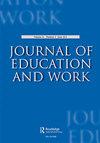迈向成功的职场转型——哪些就业因素有助于职业生涯的早期成功?
IF 1.7
Q2 EDUCATION & EDUCATIONAL RESEARCH
引用次数: 4
摘要
摘要:对于毕业生来说,从大学到职场的过渡是一个充满挑战的阶段。本纵向研究的重点是就业能力因素及其与这一转变和早期职业成功的关系。参与者是43名毕业生,他们在毕业时接受了采访,并在三年后填写了后续问卷。数据采用定性内容分析法进行分析。研究结果揭示了与早期职业成功相关的五个就业能力因素:(1)职业计划和目标,(2)与学位相关的感知能力,(3)自我效能信念,(4)活动和(5)工作经验和网络。基于就业能力因素和职业成功的差异,出现了三个过渡群体,我们将其称为平稳过渡、渐进过渡和崎岖道路。研究结果揭示了就业能力因素的个体差异,以及这些毕业生在过渡阶段和职业生涯早期遇到的挑战。对毕业生差异的认识可以帮助教育工作者发展实践,更好地支持学生和毕业生向工作生活的过渡。这些发现突出了在学习期间积极进行职业规划的重要性。本文章由计算机程序翻译,如有差异,请以英文原文为准。
Towards a successful transition to work - which employability factors contribute to early career success?
ABSTRACT The transition from university to working life is a challenging phase for graduates. The focus in the present longitudinal study is on employability factors and their association with this transition and with early career success. The participants were 43 graduates who were interviewed at the time of their graduation and filled in a follow-up questionnaire three years later. The data were analysed using qualitative content analysis. The results revealed five employability factors relating early career success: (1) career plans and goals, (2) perceived competences related to the degree, (3) self-efficacy beliefs, (4) activity and (5) work experience and networks. Three transition groups emerged based on the differences in employability factors and career success, which we labelled smooth transition, progressive transition and a rocky road. The results revealed individual variation in employability factors and in the kind of challenges these graduates encountered in the transition phase and in their early career. An awareness of the ways in which graduates differ could help educators to develop practises that better support students and graduates in the transition to working life. These findings highlight the importance of active career planning during one’s studies.
求助全文
通过发布文献求助,成功后即可免费获取论文全文。
去求助
来源期刊

Journal of Education and Work
EDUCATION & EDUCATIONAL RESEARCH-
CiteScore
2.70
自引率
14.30%
发文量
40
期刊介绍:
The Journal of Education and Work is an international forum for academic research and policy analysis which focuses on the interplay of the education and economic systems. The journal examines how knowledge, skills, values and attitudes both about and for work and employment are developed within the education system. The journal also explores the various forms of industrial training and accreditation in the economic system, including changes in the economic and industrial infrastructure which influence the type of employees required. Work in the informal economy is also included.
 求助内容:
求助内容: 应助结果提醒方式:
应助结果提醒方式:


